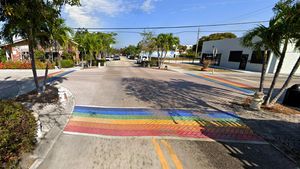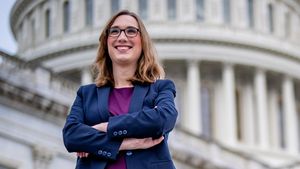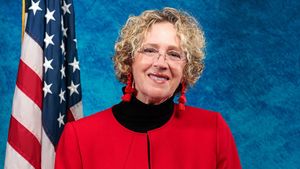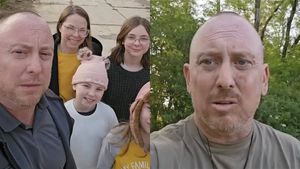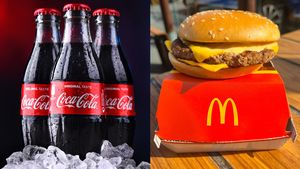
CONTACTAbout UsCAREER OPPORTUNITIESADVERTISE WITH USPRIVACY POLICYPRIVACY PREFERENCESTERMS OF USELEGAL NOTICE
© 2025 Pride Publishing Inc.
All Rights reserved
All Rights reserved
By continuing to use our site, you agree to our Privacy Policy and Terms of Use.
Way back in 1972, mainstream heterosexual actors Hal Holbrook and Martin Sheen portrayed a gay male couple in That Certain Summer, a primetime Movie of the Week for the ABC network. It was historic, if not exactly memorable, for the risks Holbrook and Sheen took advancing public identification with homosexuality (at that time a compassionate, not sanctimonious, act). I remembered that forgotten Summer while watching the new film Love Is Strange where today's equivalently established, mainstream actors, John Lithgow and Alfred Molina, also play a gay male couple.
As Ben and George, recently married in New York City who must give up their West Village home and separate, Lithgow and Molina, two highly theatrical, never quite believable actors just like Holbrook and Sheen, represent comfortably adjusted middle-aged white figures--such as mainstream gays like to see themselves portrayed: in the midst of middle-class normalcy.
Love is Strange doesn't strain that wishful identification as far as the already forgotten indie-lesbian sitcom The Kids Are Alright did (Annette Bening and Julianne Moore played quasi-bisexual paragons). This is due to director and screenwriter Ira Sachs who boldly advanced independent filmmaking with his great, intense gay debut feature The Delta (1997). Here, Sachs challenges mainstream conventions with a method that goes back to the problem/protest film--the genre that always marks the beginning of American film culture' social consciousness about sex, race, and class.
With its almost apologetic title, Love Is Strange dramatizes gay male acceptance as its primary issue. Ben and George's feelings of being suddenly marginalized return them to the beginnings of gay identity. The old men's identity crisis is reflected in Ben's relationship with his young nephew Joey (Charlie Tahan) going through his own adolescent confusion with his nubile best friend Vlad (Eric Tabach). (The shot of Joey alone on a staircase is Sachs's emotional and visual highpoint.)
Powerlessness was also the theme that distinguished The Delta, where Sachs got to the frightening heart of class and race differences that tragically intersected in the gay underworld. No other American gay filmmaker has used social identity for such a painstaking, honest view of sexual common ground. Sachs's previous film Keep the Lights On made a tortured admission of the masochistic risks when gay desire clashes with insecurity--existential powerlessness. And Love Is Strange finally becomes existential beneath its troubled, if ostentatiously gentrified, surface where gays enjoy accomplished friends, chic surroundings, and genteel pursuits.
Love Is Strange provides a way-back machine for gay self-awareness by modeling itself after the classic 1937 Hollywood film Make Way for Tomorrow. Leo McCarey's comic tearjerker showed an elderly couple (Beulah Bondi and Victor Moore) forced to separate and live apart, each parent rooming with one of their ingrate children--absurd reality preceding mortality. Sachs takes a similar tone toward Ben and George's lives. A moving sequence observes them leaving a West Village bar then promenading past Village landmarks towards a woeful, certain fate. This momento mori sequence personalizes gay social history as a reminiscence, a legacy, and as a eulogy.
Sachs recognizes the current state of gay social acceptance but also laments an unacknowledged past, generations passed over by time, and the inevitable self-regard of class and generational advancement. During a grandstanding moment of the terrible Melissa McCarthy film Tammy, Kathy Bates, playing a butch lesbian, instructed a young woman: "You know, gay hasn't always been in fashion, my dear!" Sachs isn't so inane; he confirms Bates's declaration by focusing on Ben and George's constancy.
Looking back, their relationship recalls an idealized version of the complicated and powerful emotional conflicts that Richard Burton and Rex Harrison acted out as an elderly gay couple in the 1969 film Staircase. Love Is Strange isn't nearly as strong as that trailblazer (see Staircase now, however you can) but Sachs's gratitude towards gay pioneers fulfills a different, contemporary need. By relating to the parental plight of McCarey's Make Way for Tomorrow rather than the social and psychological depth (and humor) of Staircase, Sachs confirms society's normalizing of gay couples and gay conditions.
It would be unfair to blame Love Is Strange for its upfront bourgeois essence. It is what it is. And though it feels less adventurous and splendid than the impassioned modern gay consciousness of Julian Hernandez's I Am Happiness on Earth, it yet, in its conventional way, encourages a recollection of both gay social and film history which is very helpful and laudable. So much pop culture focuses on youth just to get at its indiscriminate disposal income. Youth-obsessed gay pop culture threatens to slight the deepest human concerns. Sachs keeps those concerns in balance by reminding the gay audience to make way for tomorrow.
Love is Strange is in select theaters Aug. 22. Watch an exclusive clip here.
Watch Now: Pride Today
Latest Stories
'We take care of us' is more than a slogan–it's the motto of a revolution
July 23 2025 6:00 AM
8 K-pop stars who are openly LGBTQ+
July 22 2025 6:24 PM
Laverne Cox reveals she dated 'blue-eyed MAGA republican voter' for three years
July 22 2025 6:11 PM
Heavy metal icon and gay rights supporter Ozzy Osbourne dies at 76
July 22 2025 2:48 PM
Bob the Drag Queen says, 'No one should be speaking to Charlie Kirk'
July 22 2025 1:00 PM
Trisha Paytas announced the name of her third baby
July 22 2025 11:23 AM
Sarah McBride's first bill just passed Congress & not one Republican voted against it
July 22 2025 10:29 AM













































